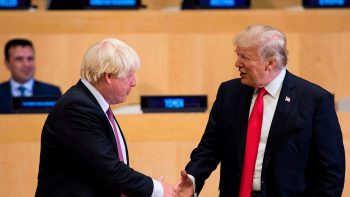Why are U.K. elections so cheap?
Share Now on:
Why are U.K. elections so cheap?
TEXT OF STORY
Kai Ryssdal: As we gear up for this fall’s congressional elections, voters over in the U.K. are expected to cast their ballots in a general election in about a month-and-a-half. Like a lot of British politics there’ll be some good stuff: Stinging putdowns and elegant trashing of the opposition. One thing it’s not going to have is the kind of financing we’re used to. British politicians face strict limits on what candidates and parties can spend.
From London, Christopher Werth reports.
TONY BELTON: OK, let’s go…
Local council member Tony Belton. On a cold rainy night, he’s campaigning for re-election on a run-down housing project in Battersea, South London. Belton and his supporters are members of the left-leaning Labour Party, which has held this constituency for the past 13 years.
BELTON: Hi, sorry to bother you this time of night. Can you spare just a moment?
This is a neighborhood in transition. The swank new American Embassy will soon be located here. A sign of just how much Battersea has changed over the last few decades.
BELTON: When I came here, the riverfront was all smokestack industries, and they’ve all gone. So all the people who used to work there are gone.
The old blue collar Battersea was a Labour party stronghold. But in 2005, Labour won here by a slim margin, just 163 votes. So the rival Conservatives are pouring money into the race here and others like it.
They say they can raise about $40 million for the forthcoming general elections. Labour might only raise a third of that.
In the U.S., candidates are expected to spend about $4 billion in the midterm elections.
Justin Fisher is a professor in political science at Brunel University.
JUSTIN FISHER: If you look at the sums that are spent in the U.K., they’re dwarfed by the sums that are spent in the U.S.
There are strict limits here on how much parties can spend on elections. It’s no more than about $28 million each, though there’s no limit on how much they can raise.
In any event, costs are lower because paid political advertising on television and radio is banned. It’s only in places like party Web sites that you find slick ads like this one.
Political Ad: I will vote for Tory at the next election, because I think they have the most to offer the U.K., and I feel safer in their hands.
Britain’s major political parties are given a small but equal amount of network air time for free.
Even so, they’ve still managed to rack up mountains of debt.
Keith Ewing is with King’s College London. He says Labour is still struggling to repay the roughly $21 million it borrowed during the last election from a handful of wealthy supporters.
KEITH EWING: We have this new phenomenon in British politics of the very rich sugar daddy who is prepared to fund the parties.
Recently, the Conservatives were embarrassed when it was revealed that one of their biggest sugar daddies, Lord Ashcroft, doesn’t pay all of his taxes in the U.K.
But donors are a potential liability for both parties.
Voters suspect that Conservatives who get big donations from financial institutions may not be willing to crack down hard enough on the banks.
And Labour, which relies heavily on the unions for funding may not be impartial in industrial disputes.
In London, I’m Christopher Werth for Marketplace.
There’s a lot happening in the world. Through it all, Marketplace is here for you.
You rely on Marketplace to break down the world’s events and tell you how it affects you in a fact-based, approachable way. We rely on your financial support to keep making that possible.
Your donation today powers the independent journalism that you rely on. For just $5/month, you can help sustain Marketplace so we can keep reporting on the things that matter to you.


















